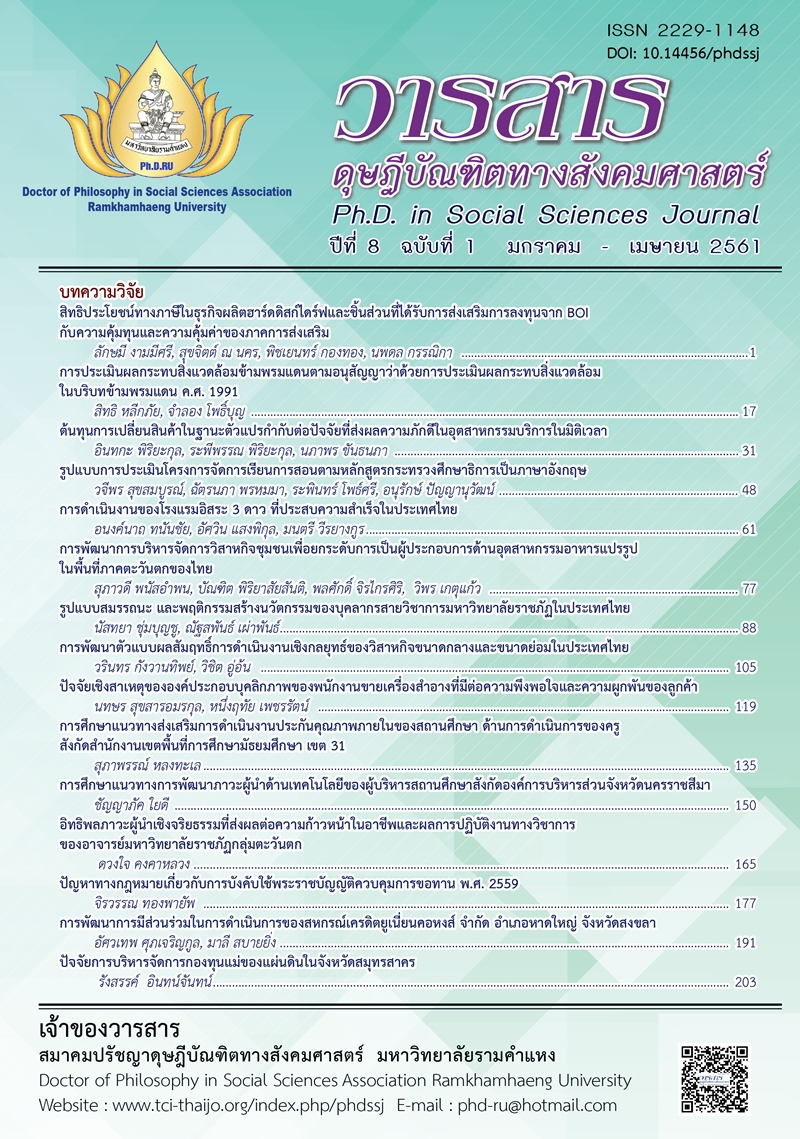AN EVALUATION MODEL FOR ENGLISH PROGRAM SCHOOLS OF ENGLISH PROGRAM SCHOOL
Main Article Content
Abstract
This research aimed to (1) study status and should be and (2) develop an evaluation model for English Program schools of English Program school by conducting a semi-structured interviewed of 8 sample school’s self-assessment committee from both school types: 4 of English Program schools and 4 of Mini English Program schools, 3 from each one and observing schools’ content. Conducted in-depth interviewing from 25 stakeholders, analyzed contents then developed model. Checked a model quality by using Delphi technique, 17 experts answered the questionnaire, analyzed the median and interquartile range.
The result showed that
1. the present English Program evaluation model was uncompleted as follow: lacking of stakeholders in evaluation, giving only 5 percentage of CEFR test which is an important aim of English Program and using same criteria for English Program and Mini English Program school although the budget and using English as a media hours are different
2. the researcher used strengths, weaknesses and should be conditions to create a CIPA model. The model consists of 6 main elements: (1) objective; (2) evaluated dimensions that comprised of 4 main aspects (context, input, process and achievements in 14 standards 44 indicators); (3) evaluating method; (4) using the evaluation result; (5) time frame and 6) The assessors are from 8 groups of stakeholder’s representative who take all part of evaluation dimension. The experts had a consensus that all dimension of CIPA model is propriety and feasibility: Mdn > 3.5 and IQR ≤ 1.50.
Article Details
Academic articles, research articles, and book reviews in the Ph.D. in Social Sciences Journal are author’s opinions, and not the publisher’s, and is not the responsibility of the Ph.D. in Social Sciences Journal Philosophy Association, Ramkhamhaeng University. (In the case that research is done on human, the researcher has to be trained in Ethics for Doing Research on Human Training and has to produce the evidence of the training).
References
Kanjanawasee, S. (2011). Evaluation theory (8th ed.). Bangkok: Chulalongkorn University Press. [In Thai]
Karuwan, S. (2007). An analysis of problems and solutions of bilingual schools in Bangkok Metropolis. Master's thesis, Chulalongkorn University. [In Thai]
Leviton, L. (2011). Focusing on what matters: Engaging stakeholders in developing evaluation questions. Retrieved December 4, 2014, from https://www.fsg.org
Lichtenberg, T. (2013). Engaging stakeholders in your program’s evaluation. Retrieved December 4, 2014, from https://www.fsg.org
Niemted, W. (2009). An analysis of factors affecting educational quality of the English program in secondary schools under the Office of the Basic Education Commission, Ministry of Education. Ph.D. dissertation, Chulalongkorn University. [In Thai]
Office of the Education Council. (2017). National scheme of education B.E.2560-2579 (2017-2026). Retrieved May 30, 2017, from https://backoffice.onec.go.th/uploadedOutstand/2017- EdPland 60-79.pdf [In Thai]
Office of Policy and Planning Bureau. (2010). A guideline for opening a special class in schools under the Office of the Basic Education Commission. Bangkok: The Agricultural Co-operative Federation of Thailand. [In Thai]
Pansri, O. (2008). A development of an evaluation approach for the quality of English program in basic education schools. Ph.D. dissertation, Naresuan University. [In Thai]
Saengkrod, R. (2013). The development of an education quality assurance system for the bilingual public schools in Thailand. EAU Heritage Journal Social Science and Humanities, 3(1), 142-147. [In Thai]
Stake, R. E. (2001). Stake’s responsive evaluation: Core ideas and evolution. Retrieved December 4, 2014, from https://onlinelibrary.wiley.com
Stufflebeam, D. L. (1972). The relevance of the CIPP evaluation model for educational accountability. In The annual meeting of the American Association of School Administrators Atlantic City, New Jersey. (pp.1-30). February 24, 1971. Ohio State University: Columbus, Evaluation Center.
Suksena, N. (2012). A study of bilingual curriculum management in primary schools under the Bangkok Metropolitan Administration. An Online Journal of Education, 7(1), 529–540. [In Thai]
The Office of the Basic Education Commission. (2016). A guideline of standards implementation for English program schools. Bangkok. The Agricultural Co-operative Federation of Thailand. [In Thai]


